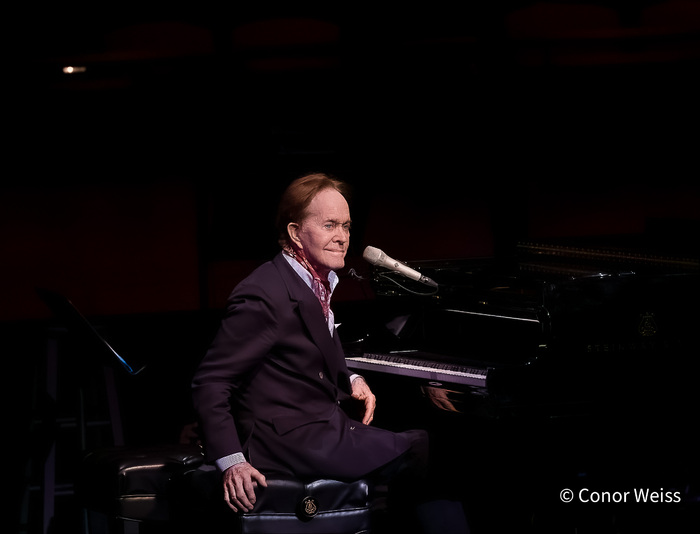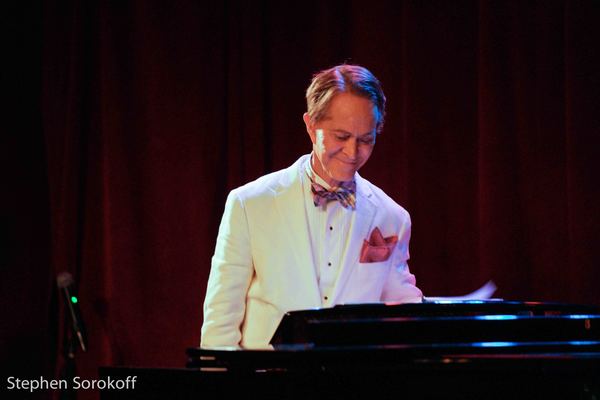Feature: December's Birthday Tributee Is A Class Act
A tribute to and interview with the royally talented "crown prince of cabaret"

As we do each month, we're celebrating musical figures with an upcoming birthday. This month's honoree is someone whose birthday is this weekend (Sunday, December 8th). For many a moon, he has been as essential part of the New York cabaret world as keys are essential to a piano. He’s been found playing pianos while accompanying his own singing of the classics of the Great American Songbook and more in clubs and concerts. He’s revered, cherished and cheered, and has enduringly endeared himself to audiences for over four decades. Some years ago he was dubbed “the crown prince of New York cabaret” by The New York Times and the name stuck. Before reviewers hearing him perform praised the way he phrased as he kept audiences amazed, he was raised in Washington DC, and fell in love…with classic songs and the piano. Starting off as an instrumentalist, he didn’t think of himself as a singer and didn’t intend to become one until something happened…. somebody asked him to. (It became a requested part of his piano job.)
He was born in New Rochelle, a suburb which is merely “Forty-Five Minutes from Broadway,” to quote the song by George M. Cohan who also wrote “Give My Regards to Broadway.” Regarding Broadway, our birthday honoree has been graciously giving his regards to Broadway songs with panache by including them in his live shows and recordings. He even has a Broadway acting credit, in a non-musical: one of the six Broadway mountings of Present Laughter, written by Noël Coward, who was also born in December — on the 16th, close to Christmas, which is why he was named Noël . The music and lyrics of Coward have been mainstays in the repertoire of the Man Of The Hour (or, rather, The Man Of The Month): Mr. Steve Ross.
To let you get to know Steve Ross, I was glad to seize the opportunity to interview him and get his story in his own words, something I haven’t been able to do with some of our past tribute subjects, for the simple but annoying reason that they’re dead (Frank Sinatra, Irving Be rlin, and the aforementioned Mr. Cohan).
rlin, and the aforementioned Mr. Cohan).
I decided to focus on his early memories of performing experiences, in the years before he was an in-demand international artist, with jobs in England, Hong Kong, Australia, Sri Lanka, and the exotic village of Peru, Indiana (hometown of the songwriter whose work he often turns to: Cole Porter). Here in Manhattan, I’d started seeing him sing and play at places like the Hotel Algonquin’s Oak Room (he was the first entertainer to be presented there when it reopened), at the annual Cabaret Convention concerts, at Birdland, 54 Below, etc., and before I initially heard him on records and on the radio series he hosted called “New York Cabaret Nights.” But his early gigs were not always glorious and glitzy and ritzy. I asked him to tell me a story about one of those. And he obliged with this recollection:
“In the early 1970s I had my first agent. Me? With an agent? I was very impressed with myself. One of my first gigs with this glamorous, grown-up representation, had me going off to some place in the wilds of New Jersey. I was looking forward to a rapt audience of show queens, hanging on every bar of Rodgers and Hammerstein pouring out of my fingers. Well, they were hanging on the bar, but it wasn't a musical one. It was a circular one –- perhaps it gave the imbibers some sense that there could be no end to their descent into intoxication, if indeed that was their goal, acknowledged or not. When I'd walked into the joint — let's be real, that's what it was — I couldn't help but notice a large pool table near the bar, with a couple of players. A small cloud of doubt appeared on the horizon of my awareness. A rather quick survey of the room did not reveal anything resembling a keyboard — these I know; I'm such a stickler about these things. I was, not surprisingly, curious. The bartender gestured above his head to a small — very small – stage which held a piano. Actually, it was a spinet. And a bench was on the top of a pyramid of circular shelves, ever-decreasing in diameter — shelves holding, you guessed it, the liquor bottles.” And so he had no choice but to make the ascent, caution being essential on the way up and the way down. “I surmised that, like other mountains and pyramids, I’d read about, the descent might prove more hazardous and less controllable. So, there I was: perched, not necessarily on Jimmy Cagney's 'top of the world.' But it was a job. I think the hours were from 11 PM until 2 AM. Rosy-fingered dawn was breaking on the Upper West Side when I finally made it home. I'd read about this time of day and its attractive coloring, but had yet to experience it first-hand. Unforgettable: the whole thing. I think I got 60 bucks …No, wait, I lie. After the agent’s commission, make that $54.”
 Having observed many audience members seek out performers after a show and gush, I wondered if he remembered any particularly odd comment in that meet-and-greet situation. He did, relating this encounter: “At the end of a set, when I was playing with my trio in DC, a lady approached the bandstand. I prepared the features of my face to smile and graciously accept her fulsome praise. Her words were: ‘My sister played the piano.’ I could think of nothing to say to her. I should have gotten into a brief but meaningful conversation about her sibling's success – or lack of it — at the keyboard, but somehow, that night, I just couldn't. I always regretted that.”
Having observed many audience members seek out performers after a show and gush, I wondered if he remembered any particularly odd comment in that meet-and-greet situation. He did, relating this encounter: “At the end of a set, when I was playing with my trio in DC, a lady approached the bandstand. I prepared the features of my face to smile and graciously accept her fulsome praise. Her words were: ‘My sister played the piano.’ I could think of nothing to say to her. I should have gotten into a brief but meaningful conversation about her sibling's success – or lack of it — at the keyboard, but somehow, that night, I just couldn't. I always regretted that.”
Also on the topic of memorable comments, I asked if there’d been a reviewer’s words in print that stood out. His choice was Michael Feingold’s summation in The Village Voice newspaper: “When Steve Ross sings and plays, New York is New York again.”
Currently on Steve Ross’s mind was the passing of performer Helen Gallagher at age 98 just before Thanksgiving, and in the spirit of that holiday’s theme of being grateful, he looks back on his own decades in show business, he muses, “I have been lucky to have been given a long life and inevitable changes that occur have reminded me that it ain't easy. It’s like sex: the worst I've ever had was wonderful." He was in the audience at the Tony Awards in 1972 when Miss Gallagher won for her performance in the revival of No, No, Nanette and her acceptance speech referencing staying in the game; addressing her peers, she said, “This award is to all of us that have stuck in a business, maybe long after anybody wanted us. Stuck because we didn’t know what else to do — no imagination — stuck because we had to stick. It’s for us that stick.” Steve Ross has plenty of imagination and is happy to keep working, to “stick” in the business, stick it out, and stick with the Great American Songbook standards he loves, some from what he calls “the remarkable musical age I've been lucky enough to have lived through.” And how lucky we all are to have the classy Steve Ross to interpret the classics. Among other engagments this fall, he covered songs of Fred Astaire at at Birdland, was part of a show focused on the work of Coward at the York Theatre, and was on stage at Jazz at Lincoln Center as part of the Cabaret Convention's Bobby Short tribute. And we look forward to more in the new year. Meanwhile, we wish him a very happy birthday.
You can learn more about Mr. Ross and listen to samples of his recordings at www.steveross.net.
First photo of Steve Ross at piano by Conor Weiss
Steve Ross in white dinner jacket by Stephen Sorokoff
Comments

Videos

